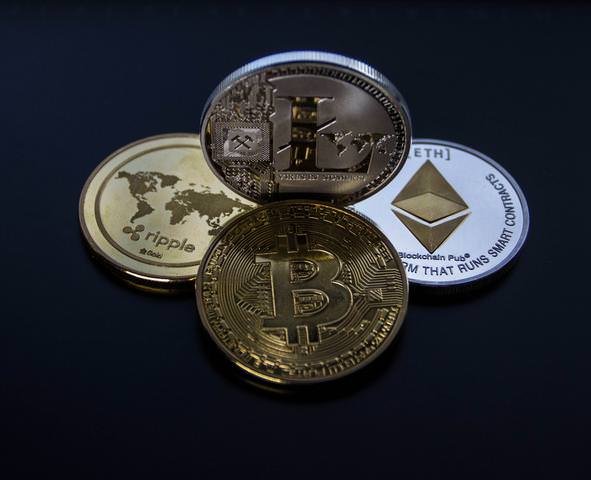
It is interesting to see how the blame for the dip in the cryptocurrency markets since January went from "the bubble" to "bitcoin futures" and then it was "Mt. Gox trustee sales". Who knows? Eventually, they will come around to something like, "governments around the world are talking about regulating Bitcoin".
Every time some government official talks about how crypto is being used for illicit ventures, they're spreading FUD, trying to justify regulation of cryptocurrency on the basis of alleged criminal activity. Every time a talking head tells us how they're going to figure out how to regulate exchanges, they're spreading FUD. No one is entirely sure how governments around the world are going to respond to cryptocurrencies. As far as I can tell, they're just winging it.
I am starting to wonder why some of the big exchanges (I'm thinking of you, Bittrex) have been so reluctant to take debit or credit cards from retail investors. I think they worry that if they take USD with VISA, MasterCard or Discover, that regulators will be on them like paint. Well, the regulators are coming, one way or another. There is just too much money at stake here.
So I was thinking about this whole question of what the exchanges are actually selling. Are they selling securities, or are they more like a foreign currency exchange? Can it be said that if an exchange is selling an altcoin, they're really just selling a pegged asset that is backed by Bitcoin? Wouldn't that be a security rather than property?
And if exchanges are selling actual coins with a wallet for each and every coin, and each and every customer, wouldn't that be an exchange of property, not a security?
I think these are the questions we should be asking of our exchanges. If they are selling a derivative, an instrument that is pegged to the market price of an altcoin, but the value is backed by bitcoin, then they are selling a security and they are not being upfront about what we are buying when we make a trade. We need to know if we're buying a security or a currency at an exchange, don't we?
So I did a little bit of research into this question of whether or not cryptocurrencies are a security. Here is what the Securities Act of 1933, as amended, has to say, at 15 USC 77b:
§77b. Definitions; promotion of efficiency, competition, and capital formation
(a) Definitions
When used in this subchapter, unless the context otherwise requires—
(1) The term "security" means any note, stock, treasury stock, security future, security-based swap, bond, debenture, evidence of indebtedness, certificate of interest or participation in any profit-sharing agreement, collateral-trust certificate, preorganization certificate or subscription, transferable share, investment contract, voting-trust certificate, certificate of deposit for a security, fractional undivided interest in oil, gas, or other mineral rights, any put, call, straddle, option, or privilege on any security, certificate of deposit, or group or index of securities (including any interest therein or based on the value thereof), or any put, call, straddle, option, or privilege entered into on a national securities exchange relating to foreign currency, or, in general, any interest or instrument commonly known as a "security", or any certificate of interest or participation in, temporary or interim certificate for, receipt for, guarantee of, or warrant or right to subscribe to or purchase, any of the foregoing.
This section presents a very complex sentence, but as I read it, it is saying that a security is an interest in a thing, not the thing itself. In other words, a Bitcoin futures contract is a security. Bitcoin is not. A Bitcoin futures contract is an agreement to buy Bitcoin at a certain price in the future, it is not Bitcoin, and that what makes a futures contract a security. A security is an interest in something else, or a privilege or right purchased from a seller who owns that interest.
A share of stock is a security, an interest in the company not the company itself. A security represents some other thing and is not the thing it represents. To me, this is the first clue that a cryptocurrency is not a security, in the same way that a dollar is not a security. It is a medium of exchange, not an interest in a medium of exchange.
To put it differently, in order for the Securities and Exchange Commission to regulate ownership in say, Litecoin, it must prove that Litecoin represents value in something else. Bitcoin has been around for almost ten years now. Litecoin has been around since 2011. It seems reasonable to believe that a competent authority would say for sure if Bitcoin or any other cryptocurrency were a security or not, but as far as I know, a definite statement has never been made by any US authority. I think that if they did, we'd see litigation light up the business section of mainstream media.
A paper by Jeffrey E. Alberts and Betrand Fry, says that as of January, 2016, the SEC has never state with certainty that Bitcoin is a security. Here is what they have to say, in relevant part:
However, the SEC has not yet publicly taken a position on whether Bitcoin is itself a security. The answer to the question of whether Bitcoin is a security is critical for participants in the Bitcoin market. If Bitcoin were found to be a security, then sellers of Bitcoin, exchanges for the transfer of Bitcoins, and special purpose vehicles formed to hold Bitcoin, among others, would be subject to onerous regulatory requirements and potential penalties for failing to meet these requirements. (emphasis mine)
Who are Mr. Alberts and Mr. Fry? In that same paper, the following short bios are given:
Jeffrey Alberts and Bert Fry are partners in the New York office of Pryor Cashman LLP. They regularly represent entities in connection with legal issues related to virtual currency and financial technology. Mr. Alberts is a former federal prosecutor and now leads Pryor Cashman’s White Collar Defense and Investigations Group. Mr. Fry has extensive experience with securities law and alternative investment vehicles and is co-head of Pryor Cashman’s Investment Management Group. The authors would like to thank Satoshi Nakamoto for making this article possible.
I think it is fair to say that they are competent to help us divine the truth in the question of whether or not Bitcoin and other cryptocurrencies are a security.
I think it is also worth noting that so far, the SEC's interest have been in the exchanges and in ICOs or Initial Coin Offerings - not the coins and/or their respective wallets. I think that in the long run, regulation of cryptocurrency exchanges and ICOs is a good thing. That will help to weed the scammers out and give legitimacy to cryptocurrencies in a financial community that appears, for the most part, to be running scared from them. I believe that focus on exchanges and ICOs are another clue.
If I buy an altcoin on an exchange, I am buying an interest in that coin. I don't actually have a wallet on the exchange that is mine. To have that wallet, I must know the private key for that wallet. To be clear, a wallet is defined as a set of public and private keys that contain a store of value, that store of value being denominated in the coin in question. As long as I leave that value on the exchange, it might as well be a security, because what I see on the exchange represents an interest in some other thing.
The moment I transfer that value, those coins, to my own wallet, where I can know the private key, then I have money, not a security. Does this analogy hold true for say, a bank? Not really. When I put money in a bank, does what I see on my paper statement represent an interest in something else? No. When I check my bank balance on my phone, the money that I have in the bank is not a security.
But what if the cryptocurrencies that I hold on an exchange are really just an asset that represents the cryptocurrency that I bought, but it is pegged to the value of the currency determined by the market, the exchange, and it is backed by Bitcoin? Now that would make what I bought, a security. In that sense, I think that the SEC would be right to claim jurisdiction.
I read the entire article by Alberts and Fry and found a consistent theme among all of the tests that the courts use to determine if a thing, an instrument, is a security. The common theme was whether or not that an instrument is an interest in something separate from the instrument itself.
For example, stock is an interest in a company. A bond is an interest in a company or other investment, such as a loan. An investment contract is an interest in something else. All of those items are just an interest in something else. Bitcoin, and many other cryptocurrencies are not an interest in something else, they are really just a medium of exchange used by a growing group of people who have formed a consensus to use cryptocurrencies as a medium of exchange.
A medium of exchange requires a consensus for people to use. Just as people must agree to use the same language to communicate and share ideas with each, so must people agree to use the same medium of exchange when exchanging value between them.
Based on what I've read so far, I'm pretty sure that whatever we buy on an exchange is a security to the extent that we do not have our own wallet with a public and private key to that wallet. And I know that there are exchanges out there, that have decentralized wallets, where everyone on that exchange has their own public and private key to that wallet. We might find it instructive then, to observe those exchanges and see how they are approached by the regulators and compare them to exchanges that do not have decentralized wallets.
If that is the bright line, I think we can expect to see exchanges changing their behavior and business model to decentralize their wallets and actually sell the currency. Perhaps then we will know for sure what we are buying at the exchanges we use.


A basic guaranteed income in the context of Maslow's Hierarchy of Needs
A sort of political movie review: Star Wars: Rogue One
Happiness isn't getting everything you want - happiness is a skill
The opposite of love is not hate, it is apathy
Fate, impunity and altruism
You got a 1.65% upvote from @postpromoter courtesy of @digitalfirehose!
Want to promote your posts too? Check out the Steem Bot Tracker website for more info. If you would like to support the development of @postpromoter and the bot tracker please vote for @yabapmatt for witness!